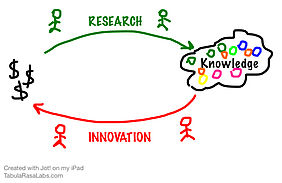2. There is so much knowledge to be harvested, and it matters!
When doing research you are focussing more and more in producing accurate knowledge about something very specific. On the contrary when producing innovation you need to "grab" a considerable amount of diversified knowledge. Hence, no matter how outstanding the knowledge resulting from a research you need other kinds of knowledge in order to create an innovation.
First, one needs to determine what sort of innovation is targeted: is it an innovation of a product, an innovation of a process (leading to higher yield, lower cost,...), an innovation in a service, an innovation in the marketplace (a product that has been targeted to marketplace may create innovation if targeted to a different marketplace), an innovation in the marketplace, i.e. creating a new marketplace like the iPad did, and so on.
Second, one has to actually create a balance between the affordability (price point sustainable by the target market) and the total cost (production, delivery, marketing, support ...). If the former in some cases may be within the grasp of a researcher (though seldom in my experience) who can have an idea of the possibile "concrete" use of the created knowledge, the total cost is beyond the experience of the researcher. All of this is knowledge, albeit a different kind of knowledge than the one produced by research (or that specific research).
Interestingly, some of this knowledge is "explicit" knowledge, in the sense that it can be learnt. It may be openly available, or it can be acquired through commercial agreements (e.g. in the case of knowledge protected by patents) or by "hiring the brains" who have that knowledge.
There is, however, another kind of knowledge, the "implicit" knowledge that is embedded in the company DNA. To give an example: building a bike is an example of "explicit" knowledge. You may not know how to build a bike but somewhere you can find the instruction for building it, or you can subcontract the building to someone else, and you get your bike. On the other hand, riding a bike requires an "implicit" knowledge. You can read thousands of pages on how to ride a bike but unless you experiment over and over you will not learn it. Nor would it help to have someone else riding the bike. In the end it is up to you to stumble and fall till you build the "implicit" knowledge.
In several cases innovation requires both explicit and implicit knowledge. This is why there is not such a thing as a manual for the perfect entrepreneur to give to a researcher so that he can learn to be an entrepreneur. Books can help you but they are no substitute for experience.







